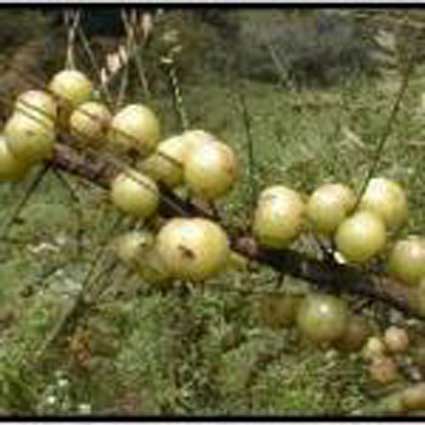
Amla # / Emblica officinalis

Euphorbiaceae
Emblica
officinalis
Amalaki , Dhatri, Amalik, emblic, Indian gooseberry , mirabolano emblico , amara, Phyllanthe emblic , nellikai , makarm pom
Blood and Yin tonic, Astringent, Aphrodisiac, Antioxidant, Anti scorbutic, hemostatic, laxative, nutritive tonic, refrigerant, rejuvenative,
Berries
Vitamin C, emblicanin A (37%), emblicanin B (33%), punigluconin (12%) and pedunculagin (14%) .It also contains punicafolin , phyllanemblin A, phyllanemblin other polyphenols: flavonoid, kaempferol, ellgaic acid and gallic acid . Also 0.5% fat ,Phyllemblin 5% , tannins ,phosphorus, iron and calcium. Pectin 75% . Plus Protein . 5 %, fat .1%, fibre 3.4 % , Nicotinic acia . 2 mg / 100 gm, carbohydrate 14.1 % .
It is one of the main ingredients in Chyavanprash, a paste used in Ayurveda as a general tonic. It is used for anemia, debility, wasting diseases, as an antiaging remedy and for general convalescence. Its high Vit C content is extremely useful for treating scurvy and as an antioxidant. Other indications are - biliousness, bleeding disorders, colitis, constipation, diabetes, hemorrhoids, hepatitis, gastritis, gout, premature greying or hair loss, tissue deficiency, weakness of the liver or spleen. It may be effective for high cholesterol and prevention of atherosclerosis as well as helping to restore collagen.
https://www.theherbalist.com.au/herb_gallery/amla